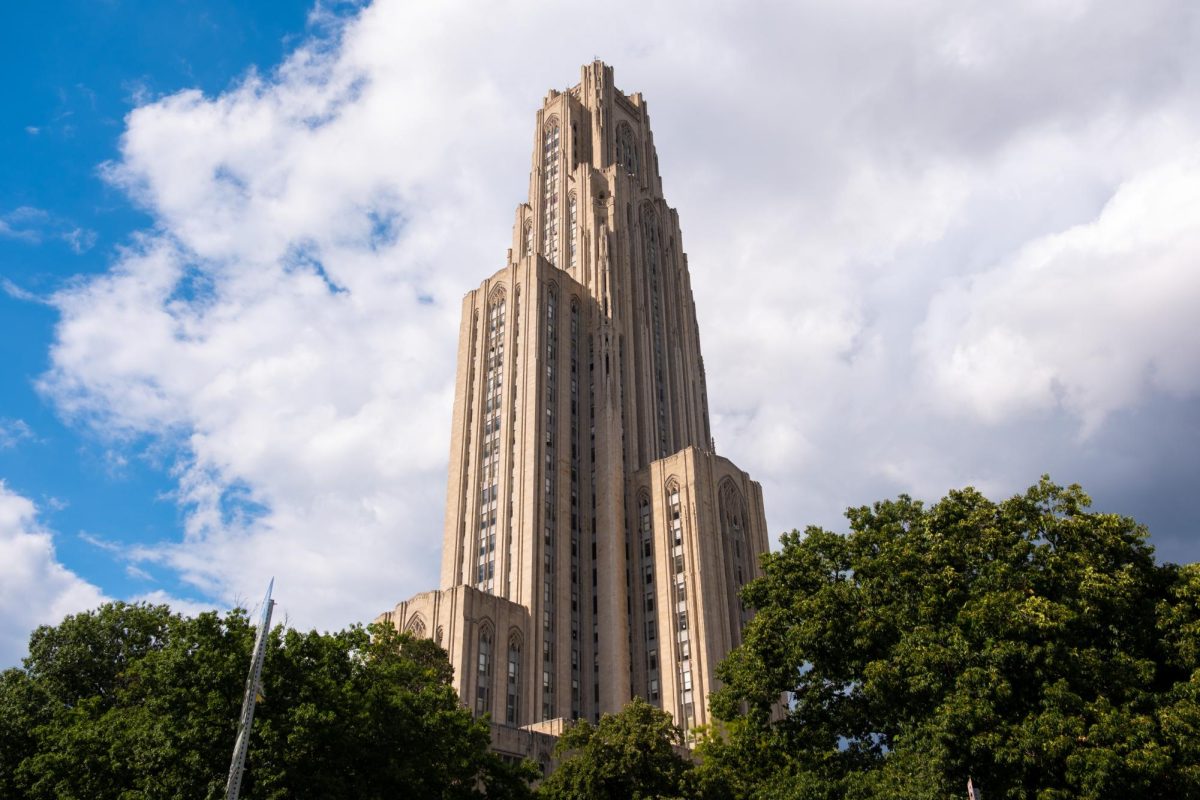Pitt filed three disorderly conduct charges and held eight conduct hearings for protestors who disrupted a Board of Trustees meeting on Sept. 29.
Most of the protesters were students, staff and unaffiliated supporters of Trans Action Building, which formed in May after a series of “anti-trans” speakers on campus. Their demands include more LGBTQ+ resources on campus, an end to “union busting” and higher wages for University employees.
Iris Olson, a Pitt staff member and Trans Action Building organizer, said the protesters split into three groups with a designated speaker in each. As they spoke, Board of Trustees Chairperson Louis Cestello repeated a warning that “continued disruptions preventing the orderly progression of board business will not be tolerated and further disruptions will be dealt with as appropriate.”
Pitt police then removed the protestors, including some from Fossil Free Pitt, who urged the University to accelerate its divestment from fossil fuels.
The conduct hearings did not result in sanctions, which could include counseling, fines or restriction of privileges, but potential consequences remain for the three Trans Action Building supporters facing charges.
“What the University of Pittsburgh is doing is clearly a tactic to try and threaten Trans Action Building, as well as Fossil Free Pitt, into not advocating for what the groups have been advocating for,” Olson said.
Iwan Martin, one of the protesters awaiting trial, lives in the U.S. as a permanent resident but fears that a conviction could result in deportation.
“All I did at the meeting was sit next to a friend who spoke out and left when I was asked to leave, and now I’m being charged with a criminal offense,” Martin said.
Court records show that each defendant has pleaded not guilty to “Disorderly Conduct Engage in Fighting,” which carries a maximum penalty of $300 in fines and 90 days imprisonment.
“When appropriate, the University uses internal conduct processes to address on-campus misconduct by its affiliates,” Pitt spokesperson Jared Stonesifer said. “However, the only recourse the University has to address misconduct on campus by nonaffiliates is what is available via the Pennsylvania criminal code.”
In its demonstration guidelines, the University reserves the right to “regulate and monitor the time, place and manner of any proposed on-campus demonstrations … to help ensure the safety and well-being of community members and the orderly conduct of classes and other functions of the University.”
Generally, Pitt can punish internal misconduct as it sees fit, according to Duquesne University law professor Bruce Ledewitz. There are limits, however. Ledewitz said Pitt is bound to the letter of its code of conduct and, as a public institution, must follow due process in internal disciplinary proceedings.
Students who underwent conduct hearings said they were frustrated with the short notice and scant details provided in their hearing notices. Thomas Allen, a member of Fossil Free Pitt, said he received information about his hearing less than a business day before it was scheduled to begin.
“I think it’s very clear that it was an intimidation tactic,” Allen said. “I don’t think it succeeded, but I think it was the intention of bringing short notice conduct violations against us.”
The Student Code of Conduct does not list any minimum notice for hearings. Stonesifer noted that students facing a lower level hearing, as Allen did, may request additional time to prepare.
At the criminal level, Ledewitz said disorderly conduct charges stemming from demonstrations are difficult to prosecute.
“People sort of understand that protest is part of the price of doing business and it’s a lot of trouble to prove exactly who disrupted,” Ledewitz said.
Four protestors, including Olson, were escorted out of a June Board of Trustees meeting without any disciplinary actions.
“We anticipated based off of that experience and what we heard from other organizations on campus and their experiences is that the same thing would happen in September,” Olson said.
Instead, the Office of Human Resources asked Olson to meet for a verbal warning about the procedure for speaking at meetings.
The University does offer an approved channel to address the board, but members of the public must submit a written request at least 15 days ahead. It should be addressed to the Chairperson of the Board and the Office of the Secretary, and include a topic of discussion. The chairperson will consider the request and, if granted, recognize the speaker during the meeting.
At least one organizer attempted this process ahead of the September meeting. A redacted email thread shared with The Pitt News shows a request sent 20 days before the meeting, but the University did not respond until the deadline had passed.
“Unfortunately, the agenda is posted. To give this the time it deserves, will you consider the next public meeting?” a representative of the Office of the Secretary said.
The University Times reported earlier this month that only administration members and fellow trustees have addressed the Board during its public meetings in at least five years.
“We appreciate the desire to speak directly to the Board in a public setting, but there are also other University processes available to community members that have the potential to lead to more effective and timely solutions,” Stonesifer said.
While smaller meetings are an option, Meredith Felde of Fossil Free Pitt said it’s also important for the board to hear their demands directly.
“The people who did speak up were not really given an opportunity to have their voices heard,” Felde said. “Even through peaceful protest methods, it’s difficult to receive respect from the Board of Trustees.”



